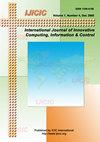Hybrid of Supervised Learning and Optimization Algorithm for Optimal Detection of IoT Distributed Denial of Service Attacks
IF 1.1
Q4 COMPUTER SCIENCE, ARTIFICIAL INTELLIGENCE
International Journal of Innovative Computing Information and Control
Pub Date : 2023-05-30
DOI:10.11113/ijic.v13n1.329
引用次数: 0
Abstract
The high-speed internet has led to the development of Internet of Things (IoT) with a fundamental Three-Layer IoT architecture. However, small amount of un-indicative data captured at the end level of IoT network makes the edge IoT devices susceptible to cyber-security attacks aimed at its transport layer. The Distributed Denial of Service (DDoS) poses significant cyber-security threat to the heterogenous IoT devices which are rendered vulnerable by ineffectiveness of conventional cybersecurity softwares. The literature reveals numerous studies that employed machine learning for the mitigation of IoT DDoS attacks but they lack in terms of an extensive investigation on optimization of machine learning classifiers. Therefore, this study first evaluates the prediction performance of machine learning classification algorithms trained on an authenticated/validated real-time IoT traffic dataset. The results reveal Logistic Regression (LR) as the most effective supervised machine learning classifier for detecting IoT DDoS attacks with a prediction accuracy of 97%. Following this, another investigation on the hybridization of LR with optimization algorithms yields Grasshopper Optimizer Algorithms (GOA) as the most effective optimizer in improving its prediction accuracy to 99%. Hence, the LR hybridized by GOA is developed as the optimal IoT DDoS Attack detection solution. Thus, the study serves to lay the foundation of a data-driven approach for the mitigation of the emerging variants of malicious IoT DDoS attacks such as zero-day attacks.基于监督学习和优化算法的物联网分布式拒绝服务攻击优化检测
高速互联网推动了物联网(IoT)的发展,其基本架构为三层物联网(IoT)。然而,在物联网网络的终端级别捕获的少量非指示性数据使边缘物联网设备容易受到针对其传输层的网络安全攻击。分布式拒绝服务(DDoS)对异构物联网设备构成了重大的网络安全威胁,传统网络安全软件的有效性使这些设备变得脆弱。文献揭示了许多使用机器学习来缓解物联网DDoS攻击的研究,但它们缺乏对机器学习分类器优化的广泛调查。因此,本研究首先评估了在经过认证/验证的实时物联网流量数据集上训练的机器学习分类算法的预测性能。结果显示,逻辑回归(LR)是检测物联网DDoS攻击最有效的监督机器学习分类器,预测准确率为97%。在此之后,另一项关于LR与优化算法杂交的研究表明,Grasshopper Optimizer algorithms (GOA)是最有效的优化器,可以将其预测精度提高到99%。因此,本文提出了混合GOA的LR作为物联网DDoS攻击检测的最佳方案。因此,该研究为缓解恶意物联网DDoS攻击(如零日攻击)的新变体奠定了数据驱动方法的基础。
本文章由计算机程序翻译,如有差异,请以英文原文为准。
求助全文
约1分钟内获得全文
求助全文
来源期刊
CiteScore
3.20
自引率
20.00%
发文量
0
审稿时长
4.3 months
期刊介绍:
The primary aim of the International Journal of Innovative Computing, Information and Control (IJICIC) is to publish high-quality papers of new developments and trends, novel techniques and approaches, innovative methodologies and technologies on the theory and applications of intelligent systems, information and control. The IJICIC is a peer-reviewed English language journal and is published bimonthly

 求助内容:
求助内容: 应助结果提醒方式:
应助结果提醒方式:


